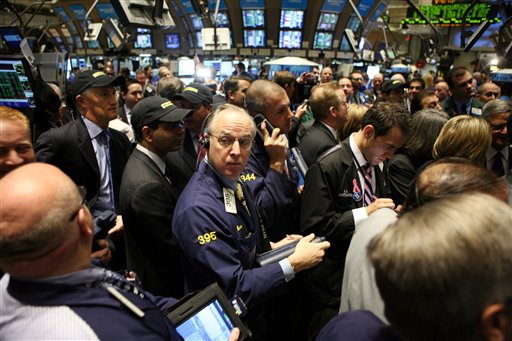Stocks are surging after European leaders agreed to a nearly $1 trillion rescue plan to avoid a major debt crisis and the U.S. Federal Reserve said it would also provide loans overseas.
Stocks rocketed higher and bond prices fell Monday after investors were reassured by a nearly $1 trillion plan to avoid a European debt crisis.
The Dow Jones industrial average rose about 360 points. The Dow and broader indexes were all up more than 3 percent. Markets also jumped in Europe.
The yield on the benchmark 10-year Treasury note, which moves opposite its price, rose to 3.54 percent from 3.43 percent late Friday. Its price fell by about a point, or $1 per $100. The drop in demand for safety holdings like Treasurys meant investors believed that debt problems in Greece could be contained.
"The market is breathing a huge sigh of relief that the EU has taken aggressive steps to contain the EU crisis in the weaker states," said Alan Gayle, senior investment strategist at RidgeWorth Investments.
The 16 countries that use the euro and the International Monetary Fund have agreed to create a nearly $1 trillion rescue fund to support European nations burdened by heavy debt loads. Markets around the world plummeted last week as fears escalated that Greece's debt problems would spread throughout Europe and upend a global economic recovery.
Investors also feared that if Greece didn't get a bailout, the fate of the euro, which is used by 16 countries, could be in trouble. The euro rose Monday against the dollar.
"Europe has unequivocally said, 'We will defend the euro's integrity,'" said Oliver Pursche, executive vice president at Gary Goldberg Financial Services in Suffern, N.Y.
The U.S. Federal Reserve and other central banks also stepped up with financial support to help head off what some analysts believe could have been a broader financial crisis.
The Fed reopened a program launched in 2008 during the credit crisis under which dollars are shipped overseas through the foreign central banks. Those central banks can then lend the dollars out to banks in their home countries.
Aside from the Fed, other central banks, including the Bank of Canada, the Bank of England, the European Central Bank, the Swiss National Bank and the Bank of Japan are also involved in the dollar swap effort.
In early afternoon trading, the Dow rose 358.46, or 3.5 percent, to 10,738.89. The Standard & Poor's 500 index rose 41.41, or 3.7 percent, to 1,152.29. The Nasdaq composite index rose 91.89, or 4.1 percent, to 2,357.53.
Stocks were highly volatile at the end of last week as investors shrugged off signs of an improving U.S. economy and focused on Europe's sovereign debt problems. The Dow fell 5.7 percent last week to erase its gains for the year, while broader indexes fell even further. On Thursday alone, the Dow was down nearly 1,000 points late in the day before recovering much of its losses.
Stocks have dropped four straight days as triple-digit Dow moves have again become the norm. Big swings were also common as the credit crisis grew in late 2008 and the market bottomed in early 2009. In recent months, however, the Dow had been climbing slowly and steadily on repeated signs the economy was recovering.
The Chicago Board Options Exchange's Volatility Index fell after spiking last week. The index, which is known as the market's fear gauge, last week jumped to about 41 from 20. That meant more investors were expecting big drops in the market. The VIX slid 30 percent Monday to about 29.
Charlie Smith, chief investment officer at Fort Pitt Capital Group in Pittsburgh, said the market's bounce reflects short-covering. That occurs when investors are forced to buy stock after having earlier sold borrowed shares in a bet that the market would fall. That rush to cover ill-timed bets can hasten the market's climb.
"You don't solve the problem of debt by printing new money," Smith said. "Whatever euphoric action we're seeing, there is going to be a need for EU banks to raise more capital."
As investors jump back into riskier assets like stocks on Monday, U.S. bond prices tumbled. Gold also fell. Both surged late last week as investors piled into safe assets.
A rise in the euro and a drop in the dollar pushed stocks higher. The weaker dollar boosts the price of commodities traded in dollars because they become more attractive to buyers outside the U.S. A drop in the dollar also helps boost earnings at U.S. companies that do business abroad.
Gold fell $8 to $1,202.40 an ounce. Crude oil rose $1.01 to $76.12 per barrel on the New York Mercantile Exchange.
At the New York Stock Exchange, 2,985 shares rose while only 144 fell. Trading volume came to 918 million shares compared with 1.3 billion traded at the same point Friday.
Britain's FTSE 100 rose 5.2 percent, Germany's DAX index rose 5.3 percent, and France's CAC-40 climbed 9.7 percent. In Greece, the main stock index rose 9.1 percent. Portugal's PSI 20 rose 10.7 percent. In Asia, Japan's Nikkei stock average rose 1.6 percent.







